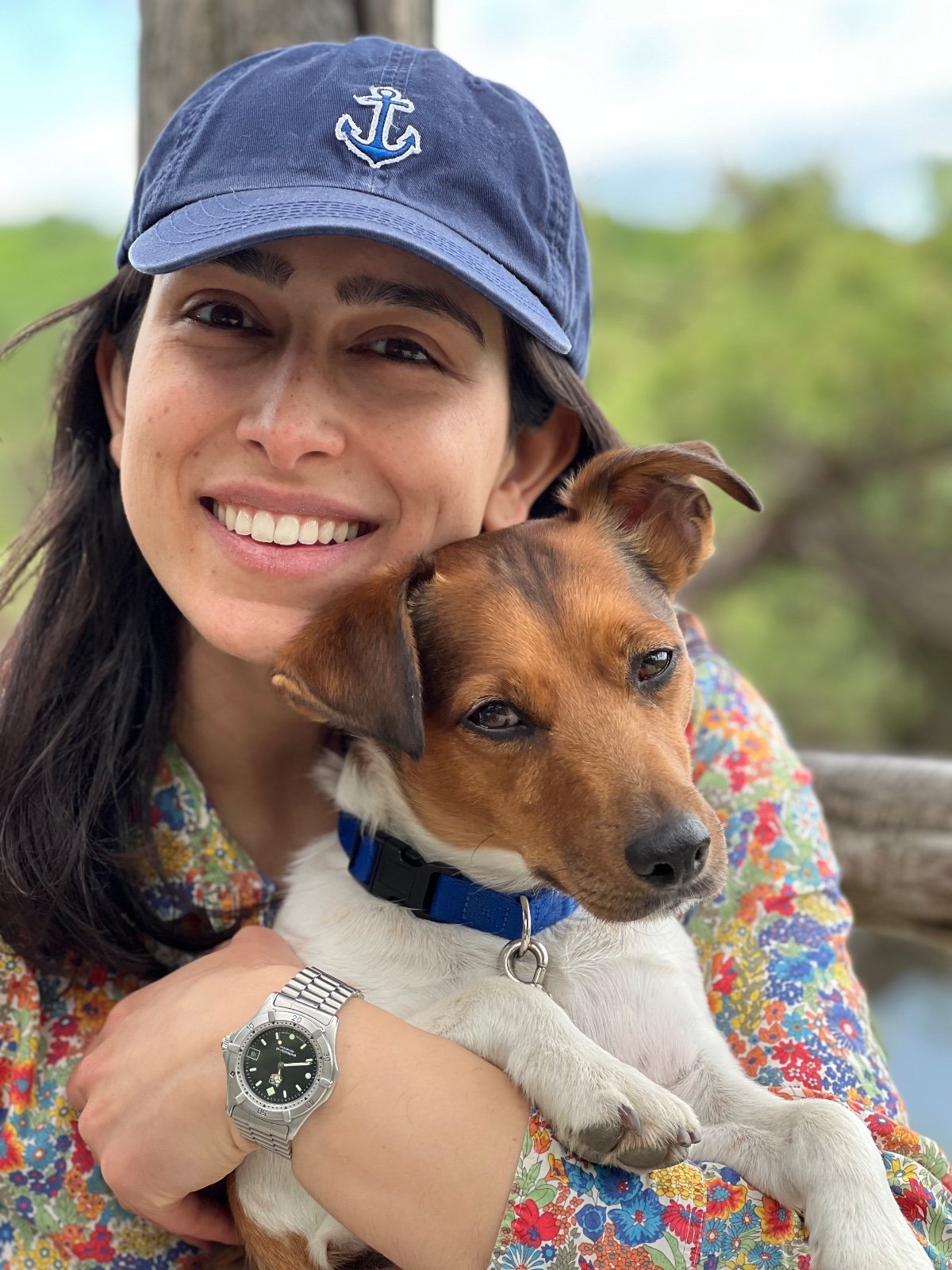WELCOME INDIA, OUR NEW DIRECTOR OF CONSERVATION IMPACT
Wild Tomorrow is delighted to welcome our new Conservation Impact Director based in New York City, India Rose Matharu-Daley. India joins the team with over 8 years of sustainability experience after completing her MBA in Sustainable Solutions at Presidio Graduate School in San Francisco. Welcome India! Get to know more about India in this interview below.
India with her Enzo, her family’s dog.
What’s your background?
My professional history is a little unusual for nature conservation! I got my undergraduate in art history at the University of Cambridge, which was a wonderful opportunity to immerse myself in aesthetics, philosophy, economics, and how the world works, all through the medium of beautiful things, but I knew I didn't want to stay in the art world.
After university, I moved to California and joined the founding team of a socially minded edtech startup in Los Angeles, Hello Genius. We leveraged AI to democratize access to education and I was lucky enough to work with the CEO and CTO, Microsoft, McKinsey, and MIT Media Lab alumni, on all aspects of the business.
My real passion, though, was nature, so I pursued an environmental sustainability-focused MBA. Although I grew up in the concrete jungles of London and New York, I was always an animal lover and knew I wanted to help the Earth. I thought that was going to be through business, but I was inspired working with conservation non-profits on a consulting project to improve ecological, social, and economic outcomes in small-scale fisheries in Mexico. I realized I could provide value in efforts to protect and regenerate the planet and decided that was where I should direct my career.
What attracted you to Wild Tomorrow?
What Wild Tomorrow has achieved in such a short time is astounding! I believe it should be a model for effective, empowering, and optimistic environmental conservation and regeneration. The team’s approach is paradigmatic of rewilding that provides benefits to the ecosystem and the people who live near and depend on it. I'm inspired by the team’s ambition every day and I'm honored to contribute to the mission of protecting and restoring wildlife and wild places.
What's a typical day for you with Wild Tomorrow?
I’m based in New York alongside John and Wendy, Wild Tomorrow’s co-founders, and collaborate with them on development and operations. Our activities vary from day to day, but we touch base with the team in South Africa and our supporters in America and Europe often. Recently, we’ve started to organize our Annual Gala and develop a framework of impact metrics for program evaluation.
What do you like to do when you’re not working?
History fascinates me. I spend a lot of time walking the family dog while listening to history podcasts, especially funny ones about American history and twentieth-century military history. Did you know that the Australian military fought and lost a war against emus in 1932? Or that a Congress representative from Louisiana wanted to introduce hippo ranching to the US in 1910? The hippos were intended to have eaten invasive water hyacinths — and solve a national meat shortage. Now you know.
Where would you like Wild Tomorrow to be in five years?
On the Greater Ukuwela Nature Reserve, I’m looking forward to seeing elephants and rhinos passing through the wildlife corridor and I’m excited to see the new Conservation Centre flourish as a nexus for education and collaboration between nature-focused organizations and community members. It would be wonderful if Wild Tomorrow could create more wildlife corridors in the region — and perhaps further afield — in the next five years as well. There are plenty of potential habitat connections in KwaZulu-Natal and around the world that could use our help.
With so much bad news around the environment how do you stay positive?
It can be difficult to stay positive when so much of what you love is being destroyed. However, despair alone cannot not change anything. We must act. It gives me comfort to know that I am fighting for nature with my career.
The new focus on biodiversity in the international discourse on sustainability is also encouraging. For instance, the World Economic Forum ranked biodiversity loss and ecosystem collapse as the third biggest global risk we face, after extreme weather events and critical change to Earth systems, over the next 10 years. At last, an appreciation of the gravity of the ecological devastation humanity is wreaking seems to be trickling into the mainstream conversation.
Have you had any close calls with dangerous wildlife?
No terrifying stories come to mind. I suppose I haven’t lived a sufficiently exciting life! On a SCUBA dive in Belize, though, a remora, a fish that attaches itself to larger marine animals via a sucker on its head, tried to latch on to me. I was flattered, but I knew it couldn’t be a long-term relationship. We live in two different worlds, the remora and I.
What advice do you give to people who want to do what you do?
If nature and wildlife conservation is your passion, be true to yourself and follow it. Time is ticking and the Earth needs all the help it can get. Always live according to your values and maintain your integrity. Too few people do that in today’s world. Be adaptable and flexible as things don’t always go to plan, but, above all, be brave. Fortune favors the bold.
Check out India speaking on behalf of biodiversity at the recent “We are the Future” summit at the UN Headquarters in New York City.

